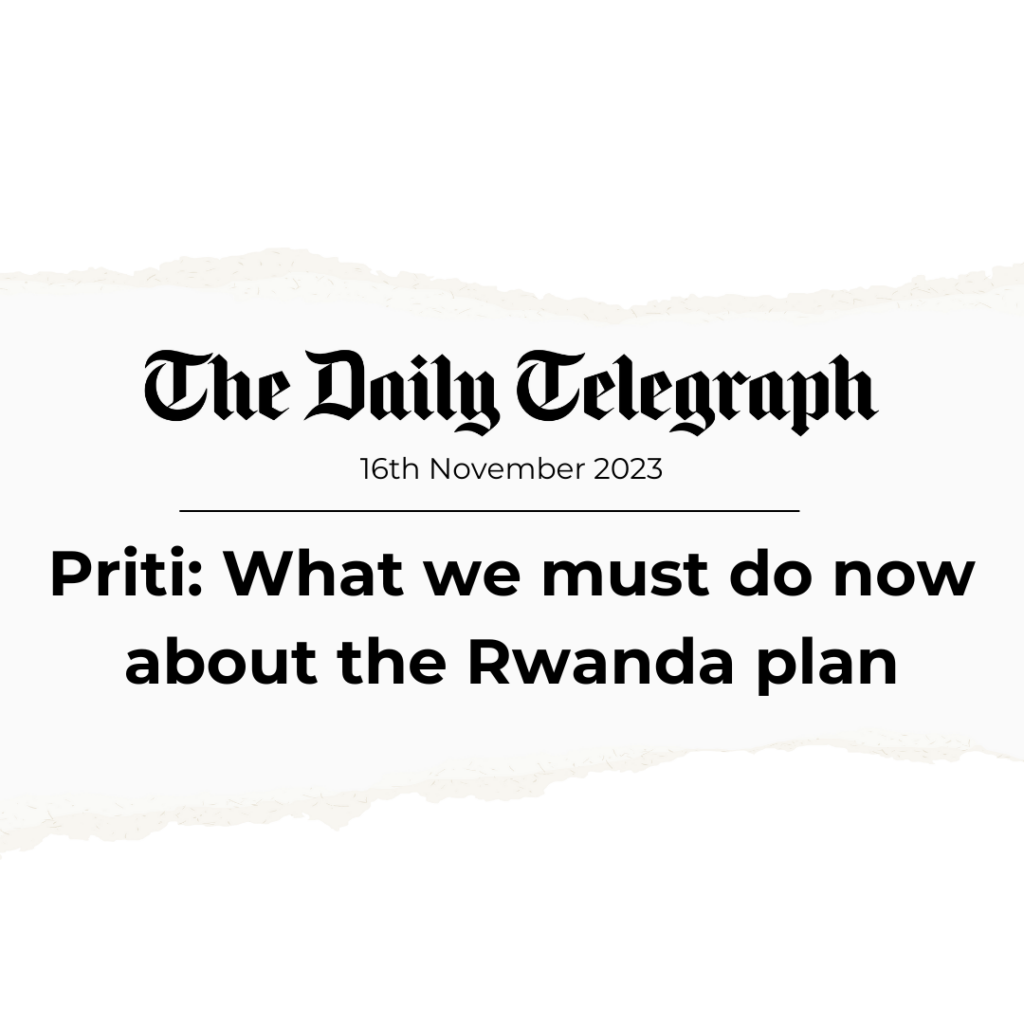
What we must do now about the Rwanda plan
By working on all options to overcome the legal barriers raised, we can get the Rwanda partnership operational, deter illegal migration and deliver the strong border controls the public expect from a Conservative Government, says Dame Priti Patel.
We are all frustrated, angry and disappointed with the Supreme Court’s decision to rule out sending asylum seekers who enter the UK illegally to Rwanda to have their claims considered there. Some are feeling confused.
People are understandably looking for quick solutions and debates have been sparked about changing laws and conventions to force this arrangement through. With the weight of public opinion firmly on the side of the Rwanda plan, the British people expect action from their Government.
In fact, while the public are angry, the only people celebrating the Supreme Court’s judgment are the Labour Party, Left-wing activists and the vocal minority who oppose robust border controls. And, of course, the evil people smuggling gangs, who show contempt for human life and who arrange the illegal small boat crossings that let thousands into our country, will be cheering this decision.
When I negotiated the Migration and Economic Development Partnership with Rwanda, I knew it would be challenged through the courts and face opposition from the liberal elite. Despite those challenges, I still pressed ahead as it is a necessary and vital measure to break the business model of the people smugglers and reduce illegal migration through small boats.
This partnership was one of many measures I put in place, and which have contributed to the reduction seen in crossings this year. Investment at the border, tougher laws on people smuggling and international cooperation tackling the criminal gangs are yielding benefits but the partnership is a key measure to deter illegal migration which is why it must succeed.
It is also a partnership that has formed a blueprint that other countries in Europe are following to tackle the unprecedented pressures caused by illegal migration and concerns over the asylum system being abused.
This is therefore a legal case we should have won and questions will be raised over how ministers prepared to fight the case and respond to the evidence critical of the partnership. The Home Office should have been able to repeal and address all the claims against it. But despite the disappointing outcome, there is still much in the decision that supports the arrangements with Rwanda and clues to how we can ensure these plans are lawfully implemented.
The Supreme Court, like the Court of Appeal and High Court beforehand, confirmed that it was lawful to have asylum claims processed in a safe third country. It also confirmed that the Migration and Economic Development Partnership with Rwanda was entered into in good faith, as were the assurances provided about the treatment of asylum seekers who are relocated to Rwanda.
The only ground that the Supreme Court ruled against the Government on was the issue of refoulement – where the Court felt that there was a potential risk that an asylum seeker in Rwanda may be sent back to the country of their nationality where they could be at risk and around how claims would be processed.
It was disappointing to see the Court reach this conclusion when a great amount of work had been put into developing the partnership, including conditions around refoulement and the treatment of asylum seekers in Rwanda. Firm guarantees were put in place in writing so I share the anger and frustration we all feel with this judgement.
But with this legal challenge lost, we must now focus calmly and strategically on finding the solutions to make this policy operational.
This will require the Government taking multiple actions and being prepared to dig in for further legal battles. The Prime Minister’s plans for a treaty with Rwanda to add legal weight to the partnership and bring in emergency legislation are welcome. But they may prove to be harder and longer to implement than suggested. Both those options risk being bogged down in Parliament, especially in the House of Lords, and again in the courts. Claims of a quick solution are sometimes easier said than done, but will have my support in being pursued.
As well as pursuing these measures, the Prime Minister must also work closely with the Rwandan government to see what operational changes can be made within the existing partnership to address the Court’s concerns. It may be possible to tighten up the current arrangements to deliver the policy without relying on new laws and treaties so this option must be fully explored. Rwanda is committed to this partnership and I know they will do all they can to make it succeed.
By working on all options to overcome the legal barriers raised, we can get the Rwanda partnership operational, deter illegal migration and deliver the strong border controls the public expect from a Conservative Government.